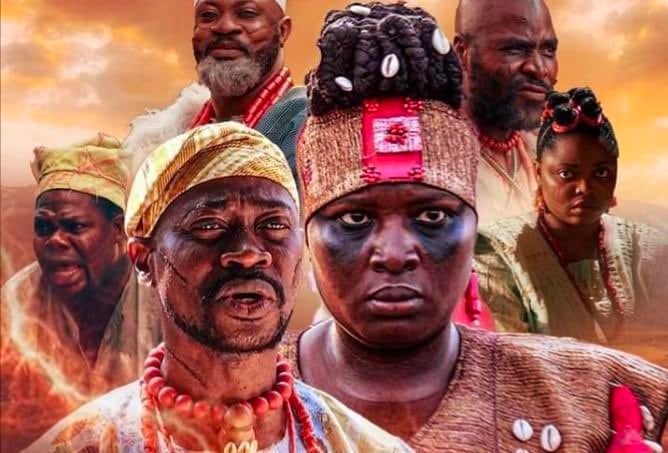Estimated reading time: 6 minutes
I thoroughly enjoyed watching Lisabi: The Uprising, and I watched it again and again, which was unlike me, not only because of its stellar cinematography, its starring veteran actors like Femi Adebayo, Lateef Adedimeji, Adebimpe Oyebade, Ibrahim Yekini Itele, Jide Awobona, Eniola Ajao, Odunlade Adekola, Adebowale Adedayo (Mr Macaroni) and Olumide Oworu who all delivered on their characters as expected, and the epic story of Lisabi vis-a-vis the historical portrayal of the revolt of the Egba people against the tyrannous rulership of the Alaafin of Oyo then and his Ilaris (tribute collectors), but also because of the depiction of the tenets of friendship, leadership, and war.

The Egba people suffered many years under the overbearing dispensation of powers by the Ilaris, who were Alafin’s emissaries or tribute collectors. This suffering resulted in multiple killings of the Egba people because they could not meet the tributes demand, which were money and farm produce, required by the Alaafin of Oyo. What culminated in a solution, devised by Lisabi (played by Lateef Adedimeji), is the rape and demise of his dearest friend’s bride, Abebi (played by Liquorose), and subsequently the killing of his dearest friend Oshokenu (played by Adebowale ‘ Debo Adedayo) by the tribute collectors.
Lisabi spends the night mourning Sokenu and ruminating on what the Egba people can do to suppress or even ward off the oppressive rule of the Alaafin’s tribute collectors. The result is the birth of Aro.
Lisabi: The Uprising tells us that war is an art, like protest, and there must be a viable prelude
The concept of Aro (the act of taking turns to work on each other’s farm) portrays the synergy of the Egba people. It appears that the Aro was suggested and instituted by Lisabi, as told by him to the young leaders of the Egba people, as a way to increase their tributes to the Oyo empire, to save them from the many assaults from the Oyo empire, a belief that was thought to be the reason the Ilaris were brutal to them. Yet, I see it as Lisabi’s shrewd means to bring the young people together, who, after being bonded by Aro, can be bonded to fight any warfare against the common evil plaguing them.
When the three of the leaders are summoned before the council of chiefs, one of the elders who knows that war always has a prelude, notices this and comments, “I know you have something on your minds. You have not done it, but you have a plan.” (Translated from Yoruba).
Another elder says, “Do you think we’re kids? As I am looking at the three of you. You don’t look like farmers at all. You look like warriors. You have not revealed what is on your mind.” (Translated from Yoruba).
War is an art, devised by the best of craftsmen, and Lisabi is one of such men. When others take turns on each other’s farms, Lisabi refuses to accept his own Aro because he knows it is not yet time for war.
In Lisabi’s words: “I appreciate what you just said, but it’s not my turn yet. When it’s my turn I’ll tell you. This is the day we’ll work so hard. That’s the day we’ll fight a huge fight. That’s the day a slave will know his place. A pawn will know its place as a pawn. That’s the day the chiefs will pay for not doing their duties. Look at me. He that has witnessed some ghosts’ anger, when the thunder strikes, he will run to hiding.” (Translated from Yoruba).
He then begins or maybe continues to secretly scheme behind them, he knows his Aro would be to fight off the Ilaris when the time is due, when the people have been bonded by the Aro to the extent that they can do anything for one another, a scheme that even some of Lisabi’s closest friends were not aware of.
ALSO READ
Lisabi: The Uprising explores the theme of friendship where loyalty and trust are immutable
Lisabi demonstrates the tenets of friendship where loyalty and trust form the pillars of the friendship. When Shokenu is going to take Abebi as a wife, he begs Lisabi to help him talk to Ikeola (played by Adebimpe Adedimeji), Lisabi’s closest friend. Although Lisabi knows that Abebi also desires him greatly and that Shokenu does not have the resources to take care of Abebi as he would, it does not deter him from fighting to let Shokenu win the heart of his love.
Oshokenu himself even remarks thus, “It’s you I commend, Lisabi. We have no idea of what goes on in the minds of many. If it were someone else who was told something like this, he would say he also needs a wife so why would he help someone else?” (Translated from Yoruba)
In response, Lisabi says, “It’s a short-sighted person who will not want the best for his friend. How could I be a stumbling block on your path? That wouldn’t be a good thing.” (Translated from Yoruba)
But what we have today is a gradual erosion of friendship where selfishness and disloyalty have taken over.
The leadership terrain in Nigeria depicted in Lisabi: The Uprising
Lisabi: The Uprising portrays the obsequious leadership of the Alake (played by Femi Adebayo) who is the King of Egbaland and his council of elders. What strikes me the most and is glaring is the lack of response of the old leaders in the land to the incessant killings of the subjects of the land, a conspicuous reflection of the leadership situation in Nigeria.
The young leader’s defiant response to taking powers into their own hands, despite a unilateral proclamation from the Alake for them to stop the Aro, which was thought to be a prelude for warring, is exactly what Nigerian youths need in this country.
Lisabi: The Uprising depicts that until agile young people come together to fight off the insecurity, kidnapping, inflation, poverty, bad policies, etc, in Nigeria, nothing will be done to combat the evils, especially when we have old leaders who have become docile onlookers, now dancing to the tunes of their oppressors and profiting from the proceeds that come from the evils like fuel subsidy removal in the country.
There is no better time than now that Lisabi could have been produced to reflect the leadership terrain and stifling economic landscape of Nigeria and the change that can never be possible until Nigerian youths become defiant and come together to fight the ills in the lands.






